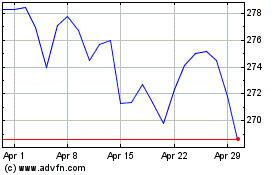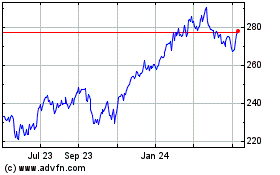By AnnaMaria Andriotis, Paul J. Davies and Juliet Chung
Collapsed payments processor Wirecard AG miscoded gambling
transactions and had high levels of stolen card purchases and
reversed transactions, leading to hefty fines from card networks
Visa Inc. and Mastercard Inc., according to people familiar with
the matter.
Visa and Mastercard each imposed fines exceeding $10 million
more than a decade ago, and the networks remained wary of
Wirecard's business. Since at least 2015, Visa executives were
concerned that Wirecard was a problem, according to some of the
people familiar with the matter.
Visa asked Wirecard to cut off certain merchants and said too
much of its business originated from risky areas such as gambling,
pornography and unregulated health-care products known as
nutraceuticals, those people said. Some of Wirecard's clients
changed names to avoid being identified as problem merchants.
Such high-risk clients were highly lucrative to Wirecard.
Pornjapan, a pornography purveyor, paid 10% fees for transactions
handled by Wirecard in 2017, according to internal Wirecard
documents viewed by The Wall Street Journal. Mainstream merchants
tend to pay 2% to 3% for U.S. credit-card purchases.
A Visa spokesperson declined to comment. A Wirecard spokesman
declined to comment.
A Mastercard spokesman said it actively monitors its network for
violations of law and noncompliance with its rules. "Where we see
areas of potential concern, we thoroughly investigate and work with
our customers to remediate any issues we identify. This may include
corrective action, fines or the suspension or termination of a
license under certain circumstances."
Wirecard, which crumbled into bankruptcy last month when it
admitted a $2 billion hole in its accounts, processed payments on
behalf of shops and online merchants. Like other processors, it
acted as a feeder of card transaction data into Visa's and
Mastercard's vast networks, which connect to banks and handle
hundreds of millions of transactions a day.
German prosecutors are investigating whether Wirecard executives
used access to the financial system to launder money dating back as
far as 2010. It has also charged executives for taking part in a
multiyear fraud going back to at least 2015. Wirecard is also under
scrutiny in the U.S. by federal prosecutors in connection with an
alleged bank-fraud conspiracy that might have relied on Wirecard as
a transaction processor and offshore merchant bank.
Visa and Mastercard watch over companies such as Wirecard that
help bring payments into their networks. While the Federal Trade
Commission has taken a more active role identifying card fraud --
and recently brought a string of cases accusing individuals and
companies of processing unsavory purchases -- the industry relies
in part on self regulation, especially outside the U.S.
The networks have powers to fine payment processors like
Wirecard. Fines, which generally aren't made public, can be imposed
for reasons including too many disputed transactions, or for
disguising the true nature of transactions. Banks and card
processors can also directly terminate relationships with
merchants.
Payments processors like Wirecard are supposed to play a
front-line role in detecting and reducing fraud by merchants,
according to Scott Talbott, vice president of government affairs at
the Electronic Transactions Association, an industry body.
"Processors can go rogue and engage in fraudulent activity --
either through willful blindness or by aiding and abetting fraud,"
he said. "The card networks are a strong link in the chain to
defend against that."
As investigators piece together the nature of Wirecard's
activities, one focus is on its practice of managing payments for
merchants other companies would avoid. Wirecard's business leaned
on servicing pornography, gambling and nutraceuticals, according to
former employees and the people familiar with the matter.
Wirecard could charge higher fees to handle these types of
payments, which are seen as riskier because customers often dispute
the charges. Sellers of goods and services pay a merchant discount
rate when they accept card payments, which include network and
processor fees as well as interchange fees paid to the card
issuer.
In the first quarter of 2017, internal Wirecard documents seen
by the Journal show merchant discount rates averaged more than 7%
for transactions done through one of Wirecard's key business
partners. Pornjapan, the pornography merchant, paid a discount rate
of 10%. Wirecard used partners to process payments in countries
where it didn't have licenses.
Card payments are accompanied by a merchant category code, which
describes the type of merchant where a consumer is shopping and
occasionally describes specific goods or services.
In 2008, Mastercard fined Wirecard GBP11 million for processing
gambling transactions under the wrong codes, according to a person
familiar with the fine. In 2010, Mastercard wrote to Wirecard's
banking unit about fresh concerns that it was rerouting through
miscoded merchants gambling transactions that banks had previously
declined. Banks would then approve these payments thinking they
weren't gambling related, according to a letter from Mastercard to
Wirecard seen by the Journal.
During several periods over the past dozen years, both Visa and
Mastercard executives have been concerned about a high number of
Wirecard transactions being disputed by cardholders, referred to as
chargebacks. These transactions often involved cards being used
fraudulently on Wirecard clients' websites, according to the people
familiar with the matter.
In 2009, Visa fined Wirecard's banking unit $12 million for high
chargebacks that occurred in October and November 2009, according
to documents publicly disclosed in an FTC suit not directly related
to Wirecard. Wirecard's total revenue for the fourth quarter of
2009, in comparison, was about $79 million.
Visa currently considers chargebacks to be high when they exceed
about 1% of purchases made at a merchant.
In October 2009, some of Wirecard's clients had chargeback rates
ranging from 2% to 15% including merchants in the nutraceutical
sector, according to documents filed in the FTC suit. Chargebacks
were even higher in November among the worst-offending merchants.
Several were well above 100%, suggesting that disputes were higher
than transactions that month. Wirecard didn't appeal the fines,
according to the documents.
Write to AnnaMaria Andriotis at annamaria.andriotis@wsj.com,
Paul J. Davies at paul.davies@wsj.com and Juliet Chung at
juliet.chung@wsj.com
(END) Dow Jones Newswires
July 27, 2020 14:49 ET (18:49 GMT)
Copyright (c) 2020 Dow Jones & Company, Inc.
Visa (NYSE:V)
Historical Stock Chart
From Mar 2024 to Apr 2024

Visa (NYSE:V)
Historical Stock Chart
From Apr 2023 to Apr 2024
